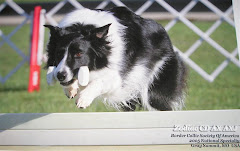I'm not against holistic or natural medicine but there's a reason for many of the traditional standards of care in veterinary medicine. We recently had a very natural and holistic minded new client at our clinic who presented with a new mixed breed puppy with no known vaccination history. She consented to the Rabies vaccination because of the local laws but declined the routine puppy DHPP-C vaccination because she declared she would keep her puppy healthy with natural foods (which I'm thinking was not dog food or a balanced homemade diet). We explained the dangers of parvo etc. but you can't force someone to vaccinate their puppy-it's her dog after all. She also declined dewormer despite the fact that the stool sample was positive for roundworms and we explained the dangers not only to her puppy but to her four young children. She appreciated our input but was confident her natural dewormer she used at home would be fine (she also used in on her kids). Two weeks later she returned for her second puppy visit and rabies vaccine (since she was too young at the first visit) and the other doctor at our practice again explained about parvo vaccines and deworming (still positive for roundworms) and again she declined the vaccine and the dewormer.
A few weeks later the same puppy presented with some, but not all of the symptoms of Parvo. She had eaten several green tomatoes a few days ago and I encouraged her to have the parvo test run because I wanted to hospitalize the dog right away if it was parvo. If it was just gastritis she should respond pretty well to symptomatic treatment. The owner declined the test as she had read on the internet and was pretty sure the dog did not have Parvo and she could not afford to hospitalize her. She then declined some of the medications I had prescribed as she had a home remedy to try. The next day the puppy was worse and she came back for the meds but still declined to hospitalize the dog which we were more and more sure had parvo as she deteriorated rapidly. The puppy died at home shortly after that with the owner feeling like she had "done everything she could do."
Clearly not all vaccines need to be given to all pets every year, immunity for many diseases is long lasting and many pets are not at risk for certain things. But there was a reason for these vaccines to be created in the first place. Many of the diseases they protect against are deadly and there are many animals at risk at some time in their life for those disease. Thousands of puppies died from parvo-that's why the vaccine was created. Many puppies continue to do so today if they are not protected. The virus is everywhere in the environment and is hard to eradicate. Not vaccinating your puppy is risky and foolish and can lead to expensive vet bills, suffering of the puppy, and possible heartache. I don't vaccinate my 14 year old dog for parvo or my house cat for leukemia or my horses for rabies. The risk is not there. But parvo will kill puppies, they are at risk, there is a reason for the vaccines. Sometimes it seems that the vaccine has worked too well and people have forgotten what parvo is like because it's not as common and they don't see it. They take this to mean that the vaccine is not needed anymore and will do more harm than good in their puppy. But ask anyone whose puppy contracted the disease and I think they will disagree. And roundworms and hookworms can have devastating effects if transmitted to children. It's unbelievable to me that parents will knowingly not deworm their dog or puppy or fail to keep them on a monthly preventative. Even if they don't care about the dog shouldn't they want to protect their kids from diseases that can cause blindness, skin diseases and more? So just remember-there's a reason your veterinarian recommends things, and it's not to make money, and it's not because that's what they were taught it school, or it's the law, or there's a new product on the market. It's just because it's good for your pet.
The Big Number 3
2 weeks ago


.jpg)
.jpg)



.jpg)



5 comments:
That is just plain sad. I know there is a place for the non traditional forms of medicating, but with Parvo being so prevalent, it almost seems that it should be a requirement like Rabies. Years ago we lost a 10 week old puppy to Parvo, and earlier this year, one of our student's dogs died of Parvo causing us to have to take many precautions in the training building due to our student's concerns. It just seems to make sense to protect a puppy. I understand some people's thoughts on not vaccinating an adult dog every year, but not a pup.
You know there is a lot of information out there about dog vaccines. Someone, whos name I will not write, has information on how puppies should be vaccinated. My breeder followed this protocal because she feels its the best for her puppies. The first vaccine isnt given until 9 weeks. So when I got my dog I took her to the vet and she dog the first vaccine. So at 13 weeks she got the second vaccine. I didnt take her out to public places or anything. I feel I was careful. Guess what. 2 days after the second vaccine she got parvo. So 5 days and 700.00 dollars later she was better. Next time I will be following the vets protocal. Not just because of the money. It was scary. Diana
That is awful. What made it worse was probably the fact that who knows the histroy on the dog- a dog that didn't have a good start, and immune system isn't going to be able to fight off anything.
I have known of people who have raised puppies- healthy, well taken care of moms, helathy well taken care of pups, and no vaccinated them. She had a titre test done on the pups at 5 months I think and the levels were okay.
I think it really depends on the care and health overall. I would never risk that with a rescue puppy. And then to turn down treatment. I hope she feels awful.
In interviewing puppy buyers, one told me she didn't believe in vaccines. We refused her a pup, but someone else sold to her the next week.
There is a lot of controversy on vaccines these days. But as someone who has seen puppies die, I know I would not let mine go without (if I had one!). That said, there are some dogs where vaccines fail (rare, but it happens) and some dogs that are raised to adulthood without vaccines. Sometimes they are just lucky, sometimes it's because they were able to combine mom's immunity with natural immunity. The problem is that mom's immunity won't last and many pups don't develop natural immunity without contracting the disease first. Hence the need for vaccines. Titre tests may help but no one knows for sure what level the titre has to be at to protect each individual dog for each individual disease. It has been interesting to hear everyone's comments.
Post a Comment